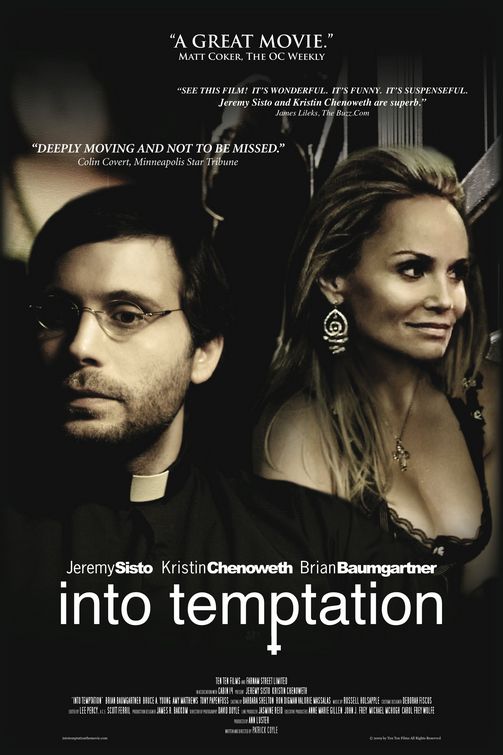 By James Zimmerman
By James ZimmermanInto Temptation, the new film written and directed by Patrick Coyle, takes its viewers on a trip through guilt, sin, and redemption. The film explores the causes and effects in a person’s life that lead, ultimately, to desperate decisions.
If it sounds like heavy subject matter, it is. But the film manages to not get bogged down in pity for its characters, though it relies heavily on religious motivations and traditions. Those who have never been Catholic, and particularly those who have never been religious, may find it difficult to sympathize with Linda’s desire for absolution.
Linda, played by Kristin Chenoweth (better known as Olive from Pushing Daisies) is a prostitute seeking to get all her affairs – please excuse the pun – in order before she ends her existence. Though her actions belie it – it’s been 19 years since her last confession – she’s apparently never mentally left the Catholic Church, and she looks for solace by visiting a confessional booth just as the priest is hoping to end his shift.
The tale of her life, frustratingly excised from the scene, coupled with his impending need to perform mass, leave the priest at a loss for words – so much, in fact, that he neglects his duty to the wayward soul. Linda leaves, without being forgiven, and Father Buerlein (played by Jeremy Sisto) spends the rest of the film searching out this fallen Catholic.
Buerlein’s search is a maddening race against the clock. He knows only Linda’s birthday (she intends to take her life on her birthday) and the sound of her voice. He tries to sketch her appearance, but seeing her only obliquely through the screen of a confessional booth, he knows only the shape of her mouth, her neck, and her chest (donned, appropriately, with a cross nestled in a plunging neckline). Buerlein seeks out the assistance of neighbors, taxicab drivers, bartenders, and fellow priest Father O’Brien, played by Brian Baumgartner (better known as Kevin from The Office), whose cynicism and greed paint a striking juxtaposition between the two religious leaders. In time, Buerlein has no other choice but to go literally into temptation, and our hapless hero soon finds himself hobnobbing with pimps, prostitutes, and criminals as he visits night clubs, adult stores, and seedy back alleys.
Again, for non-believers, the character’s challenges may seem a little trite and his difficulties unfounded. But without the limitations and structure imposed by his religion, the film would have little to go on. As it is, Buerlein openly expresses his own doubts and his unease with the religion’s rigidity; in one scene, he tells a parishioner he isn’t sure if prayer even works. In another, he appalls his congregation by using unsavory words. “Let’s say a prayer for the bastard who mugged me,” he says from the pulpit.
Into Temptation transpires in Minneapolis, and it offers many scenes and shots of places familiar to Twin Cities residents. The film is beautifully bookended with flashbacks to Linda’s childhood, both of which shed light on the story that unfolds in between. Apart from a pointless subplot featuring the return of Buerlein’s former lover, the story is tight and the pacing adequate. Go see this film before it leaves the few theaters it’s in.
Depiction, where explicit or implicit, of deities: 4/5
Depiction, whether explicit or implicit, of religion: 3/5
View of valuing this life as opposed to an afterlife: 2/5
Positive view of self-reliance: 1/5
Championship of reason: 2/5
Bottom line: 4/5
Depiction, where explicit or implicit, of deities: 4/5
Depiction, whether explicit or implicit, of religion: 3/5
View of valuing this life as opposed to an afterlife: 2/5
Positive view of self-reliance: 1/5
Championship of reason: 2/5
Bottom line: 4/5

